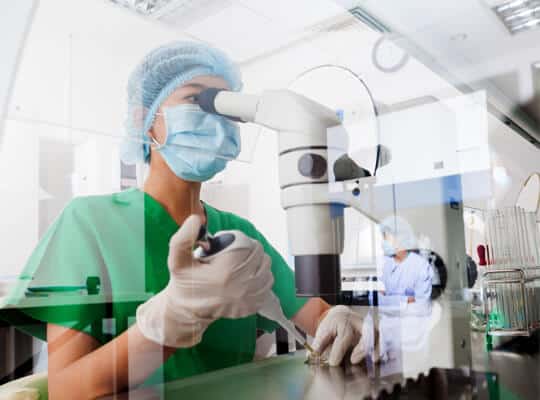How to Find The Best Fertility Clinic For You?
Table of Contents
How to find the best fertility clinic for you?
Spend some time researching any fertility clinic you are thinking about to find the ideal one for you. Don’t just pick the first place that answers the phone; getting fertility testing and treatment is a huge step that may also require spending a lot of money and effort. Only the best should be chosen.
Speaking of the best, choose a reproductive center involves making a personal and judgment call. It’s possible that the greatest clinic for your friend isn’t the best for you. So, seek referrals from your friends, doctor, insurance provider, and local support group, but make sure to complete your own research on any facility you are considering.
You can get information about clinics when doing research on them on their websites or on the CDC’s page with statistics about fertility clinics (more on that below)

Taking into Account the Fertility Experts
A fertility clinic’s doctors determine how successful it is. You might be allocated a certain doctor or you might see a few different doctors on a rotational basis, depending on how the clinic is set up. Both arrangements have benefits and drawbacks, but typically you want one doctor to serve as your primary point of contact and case manager.
Questions to consider when choosing a doctor are:
Do they provide you thoughtful responses to your queries? Can you send questions during the testing and treatment process?
They may not have time for you as a patient if they are unwilling to meet with you before choose them. It’s not a good indicator when someone refuses to respond to your questions right away.
Is an andrologist employed by your clinic? The urologist? reproductive doctors?
Having an andrologist and/or urologist on staff is crucial if you’re dealing with male infertility concerns because they can collaborate with a reproductive endocrinologist. A reproductive surgeon is a plus and maybe a necessity if you have endometriosis or other structural problems.
With which hospitals are they connected? Accepts your insurance at that hospital?
Even if your insurance doesn’t cover fertility treatment, you’ll want to be covered in case you end up in the hospital due to treatment-related issues.
How long has the clinic’s director worked there? What about the rest of the staff?
The likelihood of a productive workplace increases with employee retention at the clinic.
The clinic employs how many reproductive endocrinologists? Who will you see when you visit? Will one doctor or a team manage your case?
Having a team is advantageous if your case is complex. Having to interact with a different doctor at each session, though, can feel impersonal.
Questions to Ask About Testing and Treatment Financing
The majority of clinics have staff members who can take care of the financial aspects of testing and treatment. On your initial visit to the clinic, you should sit down to discuss your options and ask questions, and they should be able to respond to your inquiries on pricing and payment plans.
Although it may seem strange to think about cost when evaluating clinics, doing so is crucial from a practical standpoint. Some treatments cost thousands of dollars, and if you won’t be able to afford as many cycles at the pricey clinic, a less expensive clinic that offers all you need can be preferable to the fancy-schmancy clinic down the street that offers more.
The following are some financial considerations:
- What kind of insurance, if any, is accepted? And will employees deal with insurance claims? If not, will they give you the documents you need to apply for your own insurance coverage?
- Does their payment plan exist? Will you be required to make any upfront payments? The amount? What costs are incurred if your IVF cycle is stopped prior to egg retrieval? What if it is abandoned prior to the embryo transfer?
- Do you suggest or provide any financial programs? Does the clinic collaborate with any federal infertility finance schemes like the ARC Fertility Program or the network of Attain Fertility Centers? If you sign up with a certain fertility funding scheme, do any doctors or staff members receive kickbacks or financial incentives? (If so, make sure the financial program is really the best choice.)
- Do you have a scheme for IVF refunds? These are programs that demand a sizable upfront payment but offer partial refunds if you are unable to conceive after a predetermined number of cycles. One thing to be wary of with these programs is that, in an effort to increase your chances of success, the clinic may treat you more aggressively by pushing for greater ovarian stimulation or transferring an excessive number of embryos. Ensure that the refund program enables you to specify the number of embryos that are transferred, and gives you enough time (more than simply one month) between cycles to rest and recoup.
- How much do freezing and storing embryos cost? How about a cycle with a frozen embryo transfer (FET)?
- Does the clinic provide any inexpensive housing options if it is a long way from home? arrangements with nearby hotels, perhaps.
What to Ask About Procedures and the Lab at the Fertility Clinic
Questions to discuss with the doctor include:
- What to Ask About Procedures and the Lab at the Fertility Clinic?
- Where are procedures and examinations conducted? Will you need to go somewhere else or does the clinic have a lab on-site? How far is it from the clinic if it’s somewhere else?
- What medical treatments can be performed at this clinic? Do they utilize IVF? ICSI? Blastocyst transfer or alternative methods of assisted reproduction? Do the operations take place in the clinic or somewhere else? If so, which medical facility? Can certain tests and procedures be performed closer to your home if you live a long way from the clinic?
- What possibilities exist for using donors or surrogates? Does the hospital have a donation program, or must you go through a third party? Are you only allowed to use donors through their donor program if they have one, or may you also use an agency if you so choose?
- Do they provide services for embryo donation? What if you choose to give any of your extra embryos to research or to a different infertile couple? Could they assist you with that?
- Which procedures, specifically, are they advising for your case? Before moving on to IVF, will they think about ovarian stimulating medications alone or IUI? How many IUI cycles are they willing to try? Different clinics could suggest various treatment options, and one of them might be better suitable for you.
- In how many cycles are embryos transferred? And who makes the decision as to how many embryos are transferred—the patient or the doctor? The ASRM strongly advises transferring just one embryo per cycle and no more than two for women under 35 with a favourable prognosis. They advise transplanting no more than two embryos in women between the ages of 35 and 37 who have a decent prognosis. They advise transferring no more than three children between the ages of 38 and 40 and no more than four children between the ages of 41 and 42. They advise transferring no more than three embryos every cycle even at the age of 42 if transferring blastocyst-stage embryos. Naturally, each unique circumstance should be taken into account.
- If the response is subpar, who decides whether or not the cycle is canceled? Can you ask that the cycle be maintained even when there is little chance of success?
- Does the facility belong to SART, the Society for Assisted Reproductive Technology? Do they follow ASRM regulations?
- Do they submit SART/CDC with their IVF success rates? If so, you should be able to use our SART fertility clinic locator to learn about their success rates. On the CDC website, statistics can also be researched.
- Is the Joint Commission or the College of American Pathologists the lab’s accrediting body? By entering the zip code of the clinic you’re looking into, you may check its accreditation on the College of American Pathologists website.
- Does the lab store embryos in the freezer? What about sperm and eggs? Where are the sperm, eggs, or embryos kept? What response plans do they have in place in the event of an earthquake or power outage?
Things to Consider About the Fertility Clinic
Before selecting a clinic, keep the following things in mind:
- Where is the clinic located? Not everyone has the good fortune to live close to the clinic they require. Travel time should be taken into account, especially if you’re considering IVF as you might need to visit the clinic nearly every day for a portion of your cycle. Keep in mind that you’ll need a place to stay and time off from work if you need to travel.
- How friendly is the staff? You’ll probably spend months or maybe years working with the clinic. Do they respond to your inquiries? On the phone, are they polite and helpful? Or do you sense that they are hurriedly moving you along?
- When does the clinic open and for how long? Can you schedule monitoring appointments before or after work if there are additional early or late hours? Are they accessible on weekends? If not, what procedures do they have in place for IVF or IUI transfers that must take place on a Saturday or Sunday?
- Are there specific times you can phone your doctor or a nurse to ask questions or obtain updates? How are calls that come in after hours handled?
- Do they provide any unique services in addition to standard fertility treatment? Do they have a counselor on staff to assist you in weighing your options? Exist any support groups there? Mind-body workshops? After the embryo transfer, is there on-site acupuncture available?
Considering Success Rates
The clinic’s success rate should be taken into account as well. As previously indicated, you can check the SART or CDC websites to see an IVF clinic’s success statistics. The clinic with the highest success rate may not always be the best. Some facilities avoid taking on challenging cases or forbid treating ladies with their own eggs who are over 40. Obviously, this will affect the numbers.
Are the clinic’s success rates higher than the US average is what you should be checking for. (See here for the country’s IVF success rates.) In addition to pregnancy statistics, you should also consider the live birth rates for your age group (which will include miscarriages). Additionally, you ought to contrast their statistics on multiple pregnancies with the national average.
Ask about the live birth success rates specific to your case and specific to the recommended treatments if you’re not using IVF. (Remember that only IVF success rates are reported to SART and the CDC; you’ll need to contact your doctor about success rates for other treatments.) Your doctor ought to have the knowledge necessary to assist you in determining whether or not the treatments are price the emotional and financial outlay.
Walk away from a clinic if they assure you of success, particularly if it comes after just one cycle. No of the cause of your infertility, there is no such thing as a 100 percent guarantee with IVF.

For More Information
Please do not hesitate to contact us for more information on the subject.



